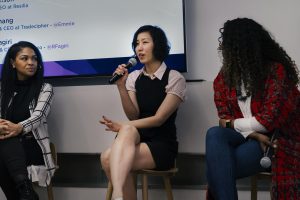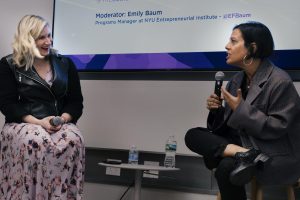2019 Empowering Women at the 2nd Annual Female Founders Forum
April 25, 2019
By Manish Devjani and James Perez
The second annual Female Founders Forum event took place on April 12th at TwoSigma Ventures, with an impressive set of speakers. The afternoon program included four different panels. The panelists discussed key issues impacting female founders, including challenges faced in venture capital business, playing against odds in male dominated industries like Finance and Technology and working on a startup while attending college. Attendees included venture capitalists, NYU student entrepreneurs, staff and volunteers from NYU Tandon, NYU Entrepreneurial institute, Berkley Innovation lab and Convergence for Innovation and Entrepreneurship Institute current as well as aspiring entrepreneurs. Emily Baum, Programs Manager at the NYU Entrepreneurial Institute kicked off the event by introducing the agenda and sharing information on some of the recent successful businesses launched by female NYU students, including Govern for America and Kinvolved. She noted from a recent Forbes article, NYU potentially has the most female friendly culture in the nation.

Above: Emily Baum, Programs Manager at NYU Entrepreneurship Institute, opening Female Founders Forum.
Panel: Female Founders in Male Dominated Industry
- Mc Kenna Walsh – Head of BD at VentureDevs (moderator)
- Edith Mandel – Principal at Greenwich Street Advisors
- Carmela Rea – Founder & CEO at Eggfund, Inc
- Stacy Blain – Co-founder & CSO at Concarlo Holdings LLC
- TeLisa Daughtery – Founder & CTO at FlyTechnista, Managing Partner & Investor at jFemX Ventures
The panelists shared their experience on mentors that helped them in their career. Most mentors were old and white men and did provide significant assistance. Edith stated that “mentorship should be organic”, it should not be looked as transactional and you should not go in with a set expectation. As you meet people at networking events, stay open to learning new things. Mc Kenna shared a quote from her father, “Life is a team sport, Even Michael Jordan doesn’t step on the court alone.” It’s important to consider a broad set of mentors, depending on the need. Different people have expertise in different areas and one person may not be able to solve all the problems you may encounter.

Above (left to right): Mc Kenna Walsh, Edith Mandel, Carmela Rea, Stacy Blain, TeLisa Daughtery
Speakers shared their experience with working in male dominated industry and some advice on how to deal with some of the challenges. Edith mentioned that “it’s important to be prepared and understand and anticipate challenges.” Dealing with hostility also came up several times during the discussion. The responses varied from ignoring it, since you can’t really change people, to confronting them. TeLisa said that she purposely messes up the name of a man who is not taking her seriously. “For example, call Paul by Peter or Barry. This gets people attention.” It’s important to focus on doing the best job. Eventually, the achievements are what will get noticed.
Balancing family life and work is usually more challenging for women. Taking care of kids can feel like a second job. It is important to let female coworkers know, that this is okay and make the corporate culture more accommodating of this.
Panel: The Future is Female: Women in Venture
- Lisa Xu – Investor in FirstMark Capital (moderator)
- Ellie Wheeler – Partner at Greycroft
- Jenny Friedman – Co-founder & Managing Partner at Supernode Ventures
- Frances Schwiep – Principal at Two Sigma Ventures
- Joanne Lin – Principal at Newark Venture Partners
All the panelists stressed evaluating the actual need to go for venture capital (VC) funding. Ellie mentioned that “99% businesses should not go out for VC funding.” The VC’s often expect the successful return on investment to be at least 10 times. The businesses usually give up a lot of privacy and ownership in exchange for funding.
Alignment and fit between the business and VC is important. Also, it’s critical not go too early in the process, wait to have something that is fairly solid to help you make a better case. Metrics play a key role in making the case.

Above (left to right): Lisa Xu, Ellie Wheeler, Jenny Friedman, Frances Schwiep, Joanne Lin
There is tons of material online to help businesses prepare for the VC process. Traditional VC funding is still a very network driven process. The VC ecosystem is collaborative. Often, one meeting can lead to another introduction.
Cold outreach via email or linkedin, can work sometimes. It’s important to have a clear purpose, do the homework and get the name right.
The moderator compared the process to dating, there is courting, fit, and not revealing too much. Frances said that “attitude is important”, including execution, trade offs, when is the right time for things and aptitude, which includes business acumen and roadmap. Founders must be okay with delayed gratification, it takes guts and trust in yourself to see it through. There will be a lot of ‘No’s’, but it’s important to stay positive and wait for that one ‘Yes’. Quarterly outreach, including update emails can be helpful. They can help reopen the conversation in the future. Joanne said that she would “love to see more female founders instead of answer questions as directly as possible, address it and pivot to what’s possible; redirect the conversation”. Jenny suggested to ensure that the competitive landscape includes others doing something similar. If there are no competitors, then explain why that’s the case.
Ellie stressed that startups have answers to the following key questions “Who are you and why are you doing this? Who else is doing it? Why does it matter?” Frances said that she is not seeing businesses “actually paint the picture.” In addition, she stressed to not “be afraid to be transparent about unknowns and use funding to get to answers.”
Panel: Starting a Startup while still in school
- Phoebe Punzalan – Associate Director of NYU W.R. Berkley Innovation Labs (moderator)
- Rachel Serwetz (Stern ‘19) – Founder of WOKEN
- Myriam Sbeiti (Tandon ‘18) – Co-founder of Sunthetics
- Earlene Cruz (Gallatin ‘18) – Founder of Kitchen Connection
- Ma Qing (Gallatin ‘19) – Co-founder of Crema Technologies Inc
The panel of current and recent grad students shared their experience in starting a company while still in school. The ideas for the businesses were usually inspired by their personal experience or desire to make a difference. Some recent accomplishments were also shared. For example, WOKEN recently won a grant from NSF, Sunthetics won the ‘Global student founder’ award in Macau. Most students took advantage of the resources provided at NYU, like the J-term or Summer sprints, Stern 300k challenge, smaller grants at Tandon Makerspace lab, coaching at Leslie eLab, talking with their Professors and fellow students.

Above (left to right): Phoebe Punzalan, Rachel Serwetz, Myriam Sbeiti, Earlene Cruz and Ma Qing
Deciding between working for a company vs. starting a business was a challenge for most of the students. Myriam mentioned how most of her friends are making 3 times her salary working for large companies, but this is not something that appeals to her. Rachel suggested asking yourself “Do you want to pursue it fully?” before making the decision. A sense of passion and purpose drove the decision making process. Balancing school and business can be a challenge. Rachel shared the importance of prioritizing the work, school, and social life. The reality in most cases as Ma stated is that you “work long hours”.
Panel: Defying the odds: Women raising capital
- Lorine Pendleton – Investment Partner at Portfolia (moderator)
- Sevetri Wilson – Founder & CEO at Resilia
- Emmie Chang – Co-founder & CEO at Tradecipher
- Reham Fagiri – Co-founder & CEO at AptDeco
The moderator, Lorine Pendleton, shared some facts, including women entrepreneurs are the fastest growing, driven by women of color. Everyday 852 new businesses are launched by women. The panelist shared their inspiration for getting into this businesses. Fundraising can be an ongoing process for most businesses. Usually, the business may start with some seed money and then continue to raise money in multiple phases. It is helpful to target investors, in case of Emmie, she focused on investors that helped family and women-owned businesses.

Above (left to right): Sevetri Wilson, Founder & CEO at Resilia, Emmie Chang, Co-founder & CEO at Tradecipher and Reham Fagiri – Co-founder & CEO at AptDeco
The incubators and accelerators can be helpful, but it is important to avoid paying for them. The reputation of the program is key. It can help develop the community as well as provide office space and access to important consultants. When developing a lead list, Emmie suggested, to: “look at your sector; research angel lists; look at the industry and who has funded that industry; look at companies and see who has invested in them; reach out to founders; and be direct as most will be okay with a 10-min conversation or coffee.”
Fireside chat with Joanne Wilson
- Joanne Wilson – Angel Investor, Blogger,Co-founder of the Women’s Entrepreneur Festival, Host of the Positively Gotham Gal podcast
- Emily Baum (moderator) – Programs Manager at NYU Entrepreneurial Institute
Joanne moved into being an Angel Investor after she realized that she had climbed many mountains and wanted to help other people climb. “Choose the right mountain climb”, she added. In the current environment, being a generalist doesn’t help anymore. There is a need to spend lots of time in the industry to understand what’s going.
The pitching deck should be 10 pages max. It should include, What I am doing? Why? What we have done? What we are going to do?

Above (left to right): Emily Baum, Programs Manager at NYU Entrepreneurship Institute and Joanne Wilson, Angel Investor, Blogger,Co-founder of the Women’s Entrepreneur Festival, Host of the Positively Gotham Gal podcast
For Joanne, the decision is mostly about the founder. Do they have the ability to grow, manage, and realize mistakes. A business with great ideas, but not the right founder doesn’t work. Over time, she has developed a gut feeling about people. For those startup managers who feel that they are having trouble finding qualified women, she suggests “If you want women, don’t interview men.” When investing in a man, she asks them to commit to hiring at least 3 women as the next hires.
Monthly updates to investors should include the good, the bad, and the ask. There is a lot that can be learned from failures. In reality, there is always some bad. Asks are also important. An example may be that you want to meet with COO of lululemon; someone with the right connection may actually make that happen. Finally, she encouraged students to use the “Student card” to help make the connections and asks you need.
Overall, the event offered valuable opportunities for emerging entrepreneurs and industry experts to come together for networking, learning, and discussing ideas to help female founders. The audience stayed very engaged and were able to relate to the challenges that were shared. There were also plenty of positive signs on the progress that has been made by female founders.
